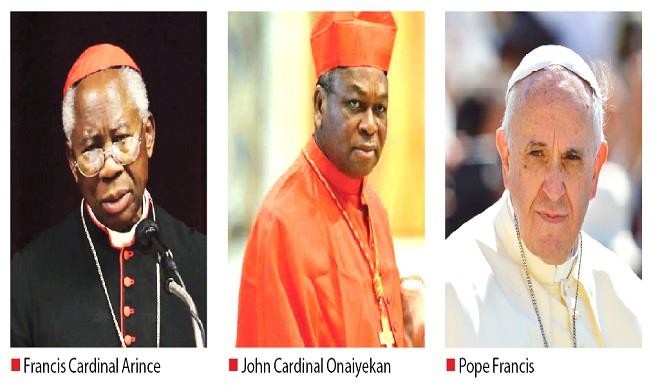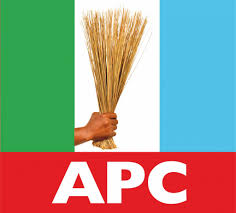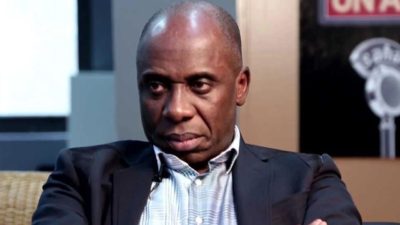What began like a smoldering fire in December 7, 2012 has snowballed into a religious burning flame that has refused to be extinguished even by the highest authority of the Roman Catholic Church in the Vatican. In fact, the flame seems ready to consume anyone who sticks out his neck. The protracted leadership crisis at Ahiara Catholic Diocese in Mbaise, Imo State appears endless. Millions of Catholics in the area last weekend re-emphasized their resolve to have an indigenous bishop who will take charge of the diocese.
The Mbaise Diocese is made up of three local government areas – Aboh, Ahiazu and Ezinihitte Mbaise, and the densely populated area is dominated by Catholics.
It was gathered that even beyond the anti-Bishop Peter Okpaleke campaign, Mbaise people also have a major problem of choosing a bishop from any other local government outside Ahiazu Mbaise where the cathedral is sited.
The late pioneer bishop of Ahiara Diocese, Anthony Adibe Chikwe, hailed from Ezinihitte Council, and there is wide speculation that Ahiazu people are spreading the mantra-“Is the cathedral built for priests from other local councils to come and head?” An elder in the area, 86-year-old Anthony Chimezie, told our reporter: “Even if you give our people the chance to choose a bishop from Mbaise, there is also going to be the problem of which local government will produce the priest, as if we are now doing party politics, and not worshipping God.”
But again, they have rejected the posting of Bishop Vincent Peter Okpaleke to Ahiara Catholic Diocese, insisting that the process of ordaining him a bishop outside Ahiara diocese and posting him thereto failed short of due process. The ‘rebellious’ faithful in the diocese claimed that the entire ‘plot’ allegedly scripted by a ‘tiny clique’ or cabal in the leadership of the church at the Vatican, head of the Roman Catholic Church, is targeted at ‘Anambranization’ of the diocese or by extension the entire Catholics in the southeast zone.
Since the logjam started in 2012, attempts by the church to apply diplomacy, using the appointment of Cardinal John Onaiyekan from Abuja as peace maker and also as intimidation to accept Okpaleke, have been strongly resisted by the people. Okpaleke, a priest of Awka Diocese in Anambra State, was appointed bishop of Ahiara on December 7, 2012 and subsequently ordained bishop of the diocese on May 21, 2013. But the development was vehemently opposed by both the clergy and laity in the diocese. The opposition said Okpaleke was unqualified for the office. Since then, Okpaleke has been living outside the diocese. He has no control over the cathedral in Mbaise. But it is not certain that the people will accept any other bishop who is not from Anambra State.
Only last weekend, lay faithful and priests of the church at the Mater Ecclesia Cathedral Ahiara Mbaise conducted a special mass in total rejection of Bishop Okpaleke.
The president of the Mbaise Catholic Priests Association, Rev Fr Augustin Ben Ekechukwu while addressing the huge congregation, described Okpaleke’s posting to Ahiara Diocese as “injustice and malicious conspiracy” meted to the people of Mbaise.
Fr Ekechukwu regretted that the action of the head of the Roman Catholic Church at the Vatican had denied both the priests and the faithful a whole lot of opportunities, spiritual and otherwise.
On the said invitation by the Vatican, Fr. Ekechukwu said the essence of the visitation was for the people of Mbaise to go and explain to the Pope the injustice meted to them.
Ekechukwu condemned the way and manner in which the invitation letter written to the diocese by the pope since April 3, 2017 was handled and even hidden by people under the pope before a verbal message was sent to them on May 10, 2017.
“The people of Mbaise Catholic Church since 7th December 2012 till date have not accepted Bishop Okpaleke as their bishop,” he declared.
Also, a priest in the diocese, Rev Fr David Iheanacho, condemned the neglect of the canon law in the process of posting a bishop to Ahiara Diocese. Fr Iheanacho said the law had always been followed in the choice of bishops in other dioceses except Ahiara where Okpaleke was imposed on the people of Mbaise without their consultation.
While appealing to the pope to rectify the said injustice done to the diocese, he said already, there were 700 indigenous priests in the diocese.
Another catholic priest of the diocese, Rev Fr Celestine Anyanwu, described the ordination of Bishop Okpaleke at Ulakwo, Owerri as unfortunate, alleging that the people of Owerri Catholic Diocese and Awo-Mamma in Imo State rejected him from being ordained in their churches.
Fr Anyanwu said Bishop Okpaleke was currently an impeded bishop because he was yet to take over the diocese, and regretted that having been ordained outside the diocese was contrary to the Catholic procedures.
Genesis of crisis
The death in 2010 of the pioneer and indigenous bishop of the diocese, Anthony Adibe Chikwe, who in line with the catholic tradition must have submitted to the Vatican about 20 names of his likely successors and the neglect of the list by the church authorities, is apparently the root cause of the crisis.
Perhaps, one vital point of argument made by the protesting priests is that it was an ecclesiastical manipulation or miscalculation for the Vatican to ignore about 700 priests of Mbaise nativity, to appoint a “total stranger” as a replacement for the late Chikwe. Mbaise people said they were surprised that the Vatican ignored their request for an indigenous bishop in accordance with the cannon law, which emphasizes grassroots and locality for bishopric appointments and ordination, for the purpose of familiarity, ease of language and good knowledge of the people’s culture and tradition. They are quick to refer to Nsukka, Uyo and other dioceses where the cannon law was applied.
“The insistence on imposing Okpaleke on the Ahiara Diocese is un-Catholic and a big shame to the nobility of the church and its leadership,” said a priest from Mbaise, Fr. Ben Ogu who added, “Ahiara Diocese is not the first agitator for this laid down rule of the church.”
However, some groups, traditional rulers and about eight priests from Mbaise have expressed support and solidarity with the embattled Okpaleke. A priest of the diocese, Fr Clement Ebi, who was reportedly made the Vicar of the troubled diocese after the resignation of the former Vicar, Louis Ashiegbu, believes that the ‘protestants’ are misguided and misinformed about the truth of the matter.
Fr Ebi said in an interview: “I don’t think their grievances are against Okpaleke’s person. I think is rather against his appointment and thus they want to stampede him to abandon the appointment. This is also my predicament as they want me to also abandon my appointment as the Vicar. I pity Okpaleke because he is like a bride in a home that does not want her.”
Ebi recalled that after Bishop Chikwe died in 2010, the pope’s representative in Nigeria, Archbishop Augustine Kasujja, told them that the church would look at the clergy from Ahiara Diocese to get a replacement for Chikwe. He explained that the exercise was usually achieved through a very secret investigative process on the likely candidates as directed by the Vatican from the beginning to the end. Noting that this is always why the appointment of a bishop is always a surprise, Ebi said during the period, people of the diocese were equally asked to pray for the emergence of one who is after God’s mind.
However, the secret inquiry eventually lacked secrecy, hence the likely candidates were revealed to both the clergy and the laity who, he said, began to criticize a few of the nominees, making the entire process a market place gossip.
“This was so prolonged that the Vatican, unable to find a replacement after two years, had to go to a neutral area for the office, and thus Okpaleke was appointed. When this happened, the priests, realizing their mistakes, then came together again to fight the emergence of Okpaleke. This is just what happened,” said Fr Ebi.
Ebi exonerated Onaiyekan from the accusation of bias leveled against him by the agitators, saying that when the anti-Okpaleke agitations began, the Vatican sent Onaiyekan to ascertain the reason an ordained bishop who is the leader of the diocese should not be allowed to perform his duties.
“After thoroughly investigating the matter and issues on ground, he was able to discover that the rejection of Okpaleke was because he was not from Mbaise, so he issued a pastoral letter where he urged all to accept Okpaleke in the best interest of peace and also for the church,” Ebi said.
At a point in the impasse, the people of the diocese woke up on July 10, 2014, to discover to their amazement that the main gate to the Cathedral had been locked. Over 60 armed policemen were stationed at the gate apparently to maintain peace and order. Although it was said that the police were kept to make sure Onaiyekan had a smooth entry into the place, the cardinal himself was prevented from entering the crisis-ridden premises, ditto Fr Ebi and every other official not inclined to the rebellion.
Perhaps, if only the people would honour the said invitation from the papacy to explain the main reason for their ‘rebellion,’ the crisis which began in 2012 will eventually come to a pleasant end, but only time will tell when that will happen. (Daily Trust)




